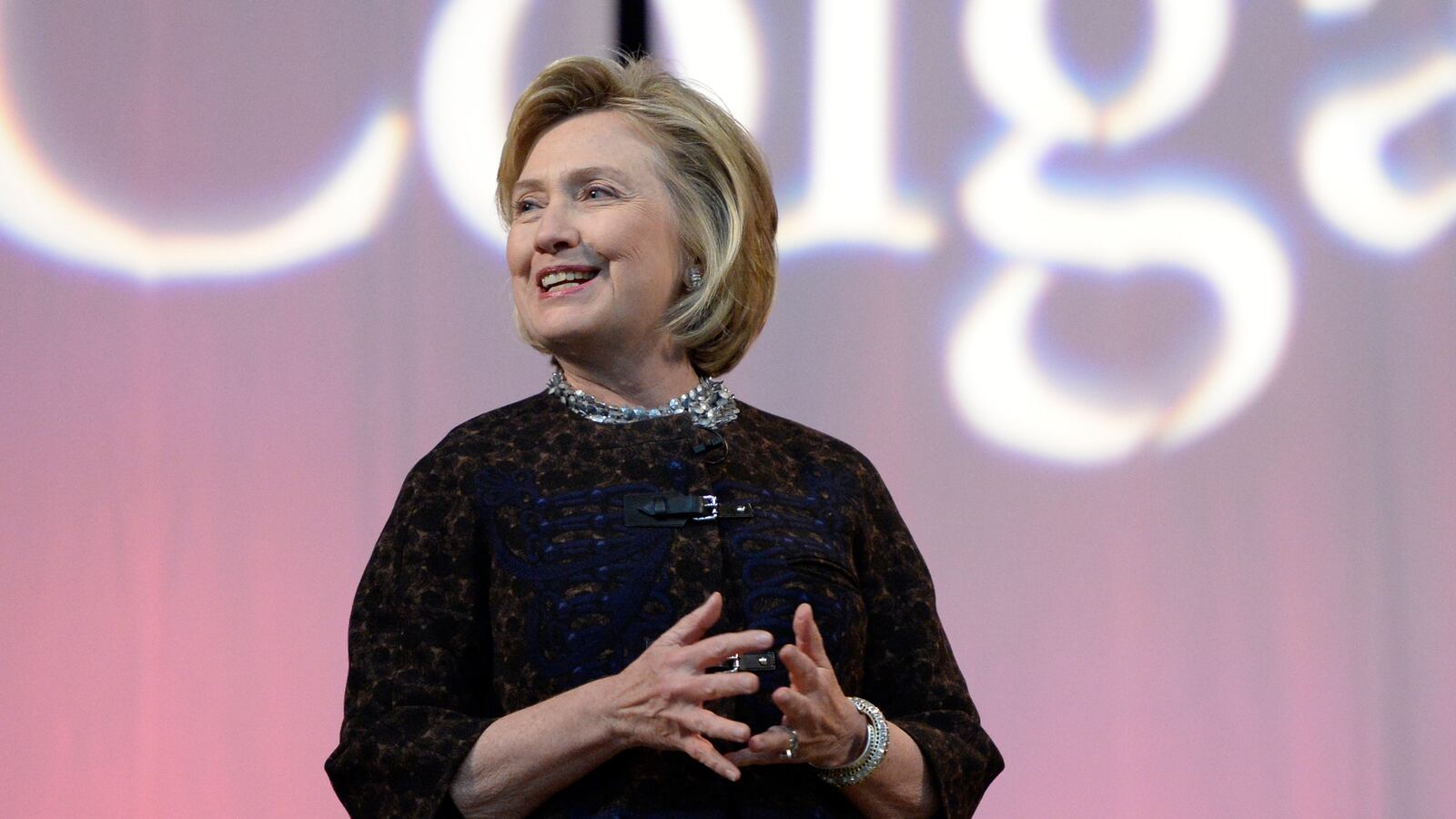Hamilton, New York
In 2008, Barack Obama promised to be a president who brought people together, inaugurating a new era for Washington, D.C. He pointed to his biography—his mixed-race ancestry, his limited experience in the partisan battles of the past—as a chance for a break from the rancor and gridlock of the Bush years.

If Hillary Clinton runs for president in 2016, she’ll have her own story to tell—about brushing off the battles of the Obama years. She’d be able to tap some key details of her biography, too, not just her time as first lady, or even as a U.S. senator.
Instead, Clinton will be able to say that she knows how to work with the other side: She reached across a stark divide when she decided to work with her former political opponent in government.
Speaking about the partisan divide that has engulfed D.C. over the last several years, Clinton told a crowd of 5,000 students and their parents at Colgate University, “Probably the most common question I was asked [by foreign leaders] was: How can you possibly work with President Obama after the two of you fought so hard in your campaign against each other?”
She did so, she said, in remarks that seemed as much directed at lawmakers in Washington as the audience here, “Because we both love our country. That was the subtext. People were struggling when elections were held and there was mayhem and conflict and violence and they look at us and they think, ‘You run against each other. You say terrible things about each other—and then you work together. How can that happen?’ So I wish we would get back to problem-solving—which we are better at than anybody in the world.”
Clinton appeared at this upstate liberal-arts college as part of a “Global Leaders” series, and her remarks were titled “The Future of American Leadership.”
“We have to lead in new ways if we hope to maintain our role in the world,” Clinton said, drawing on her most recent past—her time as secretary of State. “There is a cottage industry of declinists, but they have vastly overstated their case.”
From the perspective of her post at the State Department, Clinton told of how the government shutdown and the debate over the fiscal cliff had weakened American prestige abroad.
“Recently in Washington, we have seen what happens when politicians choose scorched-earth over common ground,” she said. Referring to House Republicans, she added, “They operate in what I like to call an evidence-free zone with ideology trumping everything else… the entire world watches how we make our decisions surprisingly closely.”
Clinton noted that even though America’s role in global affairs appeared to be on the wane, the nation remained the only one that could summon an alliance to deal with global threats. She sounded hopeful notes about the rise of China, saying there’s room in the Pacific for both powers, and added that as America frees itself from a dependence on foreign oil, global alliances will shift.
Clinton, who spoke while walking around the stage and seemingly without notes, lamented the slow economic growth that has plagued the nation since the financial collapse of 2008. She defended the National Security Agency’s surveillance programs, pointing out that even foreign leaders who complain about them rely on the intelligence they provide, adding that the State Department is subject to cyberattacks by foreign governments hundreds of times each day.
She’s made regular trips to upstate New York in recent days, appearing both in Buffalo and at nearby Hamilton College. The visits have marked something of a homecoming for a former homestate senator who represented this economically depressed region for eight years in Washington. Clinton has also frequently been appearing on college campuses. Young voters provided a huge boost to Obama in 2008, and it appears as if Clinton is trying to tap into some of that same energy should she run the next time around.
The former secretary of State met with around 40 students prior to her speech. They asked her about hydraulic fracturing, a major issue upstate that pits environmentalists against those who say that the drilling will create more jobs. Clinton, one student said, told them that providing fracking permits was something that state and federal agencies would clash on, and seemed to endorse the process under the right circumstances. She was asked about the next election, as well, and told the students that whoever ran would need to be firm in their beliefs, and not bow to the political winds.
She gave no indication, the students said, of her own political plans.
Charity Whyte, a sophomore here, remembered meeting Clinton when she came to her first-grade class in Greenville, Ill., in 2001.
That time, she said, inspired her to go to college.
“She is very personable,” she said. “And she had a very nice outfit on. As a woman, she is someone I look up to.”
Whyte, though, had no good gossip from her small group meeting with a potential future president, “Of course she wouldn’t tell us her personal feelings on things, but that is literally any politician.”





